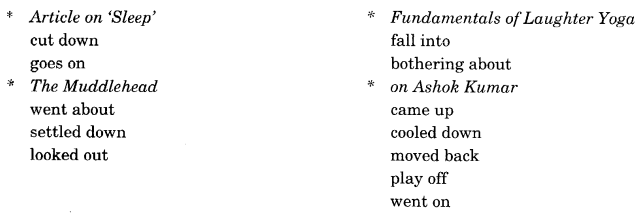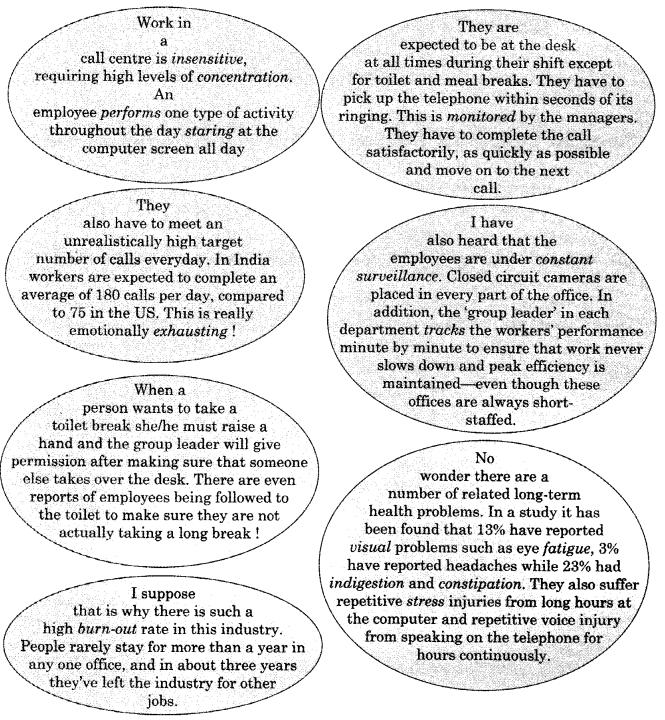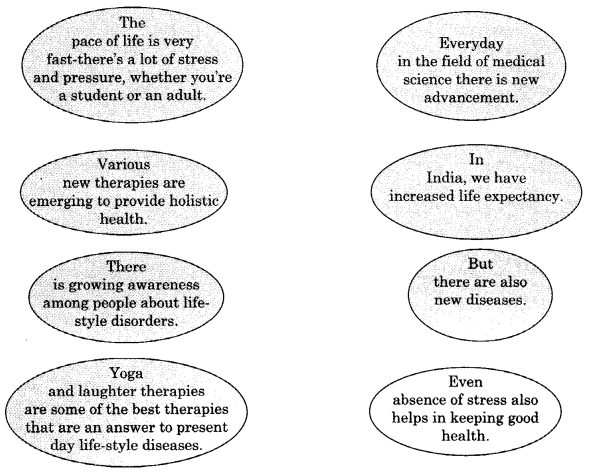NCERT Solutions for Class 10 English Main Course Book Unit 5 Chapter 1 Land of All Seasons are part of NCERT Solutions for Class 10 English. Here we have given NCERT Solutions for Class 10 English Main Course Book Unit 5 Chapter 1 Land of All Seasons.
| Board | CBSE |
| Textbook | NCERT |
| Class | Class 10 |
| Subject | English Main Course Book |
| Chapter | Unit 5 Chapter 1 |
| Chapter Name | Land of All Seasons |
| Category | NCERT Solutions |
CBSE Class 10 English Main Course Book Unit 5 Travel and Tourism Chapter 1 Land of All Seasons
TEXTUAL EXERCISES
Question 1.
Fill in information from the text to complete the notes on the passage.
India : Destination of the Millennium
I. To a tourist it offers
(a) ………….. topography
(b) ………….. beauty
(c) ………….. diversity
II. Traditional yet modern
(a) shopping : …………..
(b) family structure : …………..
(c) medicine : …………..
III. indian hospitality
(a) belief : …………..
(b) attitude : …………..
(c) unique selling point (USP) : …………..
IV. Ministry of Tourism, GO! proposal
(a) name of the prog : …………..
(b) train people to : …………..
(c) boost : …………..
(d) effort to preserve : …………..
(e) inculcating sense of : …………..
Answer:
I.
(a) wide
(b) scenic
(c) cultural
II.
(a) haats and malls
(b) nuclear and joint
(c) ayurveda and modem medical tourism
III.
(a) honounng guests is honouring gods
(b) cheerful
(c) tradition—Atithi Devo Bhavah
IV.
(a) Atithi Devo Bhavah
(b) be sensitive to tourists
(c) tourism in India
(d) rich heritage and culture
(e) responsibility towards tourists
Question 2.
Following are some web links to the most creative advertisements that are a part of the ‘Incredible India’ Campaign. Watch them and then discuss in class which one you liked best and the reason for your choice.
(a) http://www.youtube.com/watch?v=-T2qtEu9e5o&feature=related
(b) http://www.youtube.com/watch?v=ruJvV7Tb6Mw&feature=related
(c) http://www.youtube.com/watch?v=rNWeBVBqo2c&feature=related
(d) http://www.youtube.com/watch?v=rLZ9eMNezQY&feature=related
(e) http://www.youtube.com/watch?v=Dro_oER2iDU&feature=fvw
Comment on the contents of each of them. Your comments should include your opinion about the message and the visuals. Discuss in class which one you liked best and the reason for your choice. Speak about the features of the advertisement which made it more attractive than the others. Alternatively prepare a scrap book of advertisements related to the promotion of tourism in India. Discuss in class which one you liked best and the reason for your choice. Speak about the features of the advertisement which made it more attractive than the others.
Answer:
Following are the advertisements in web-links :
(a) Aamir Khan’s Incredible India Commercial—2
— Aamir speaks out against harassment of foreign tourists and vandalism of our ancient monuments by anti-social elements.
(b) Aamir Khan’s Incredible India Commercial—1
— Aamir speaks out against harassment of foreign tourists and vandalism of our ancient monuments.
(c) The Latest Incredible India Commercial, Directors Cut
— The 2 minute version of the newest Incredible India and featuring yours truly.
(d) Incredible India !
— Incredible India Promo.
(e) Aamir Khan’s Incredible India TV CF 2010
— Atithi Devo Bhavah
This campaign is aimed at Indians to help foreign tourists and to make tourists feel at home.
Comments
Students may have seen all these advertisements in different T.V. channels from time to time. Liking depends on individuals.
However, I like the last advertisement. This campaign is aimed at Indians to help make foreign tourists feel at home. Japanese actress Nobuko is one of the precious gems.
Question 3.
As an employee of the Ministry of Tourism, Government of India prepare an advertisement to promote tourism in India. You can promote tourism in your state or the country.
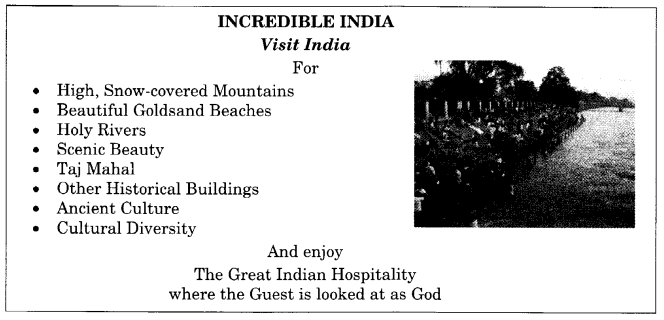
Answer:
Question 4.
Guest is God—Atithi Devo Bhavah
SUMMARY
‘Atithi Devo Bhavah’ is the essence of an old saying: ‘Treat others as you would like to be treated yourself. It implies that we shall be treated well by others if we treat them well. So we must behave better with others. It is the essence of Atithi Devo Bhauah (Guest is God). The number of foreign tourists in Intha is very small compared to those of ot her Asian countries. We can easily increase this number to 100%. This will only be a first step because the possibilities are much greater. For all this we need to change our attitude and behaviour towards the tourists. It is known that if some one is rude to you, you won’t encourage your friends to visit him.
Respect has always been an integral part of the Indian soul. We have always respected our teachers, elders, parents and guests. In the past, India was visited by travellers for enlightenment. We can bring back this golden age again through our culture of‘our visitor is God’.
The seven-point programme
To attract and assure the tourists the Government of India has launched a programme. This seven-point programme is named Atithi Devo Bhavah.
The first point is to make the people of tourism industry sensitive to the tourists. They should be told how this will benefit them also. For this these people will be given proper training and induction course. This will be the second step. The third step is to motivate these people by various incentives. Certification to ensure standards is the fourth step.
The other three steps are connected with these four. The fifth is to get a feedback from the tourists. This will help in further improvement in the tourism industry. The sixth step is to create awareness among the masses through mass media. The last is to urge all the people connected with tourism to make it their own programme.
The Charter of the Programme
The charter is also of seven points. First of them is hygiene and cleanliness. This includes not only roads and hotels but also vehicles and shops. The service providing persons should also be neat and clean.
The personal conduct and behaviour of the service provider is important. They must be courteous and polite. These people such as taxi drivers and hotel owners must be honest. Safety and security of the tourists is of utmost importance. They should display honesty and integrity.
To do these things, the government is organizing public-relation shows and using mass-media communication to create a general awareness. It is through newspapers, TV, cinema etc.
Question 5.
On the basis of your reading of the passage above, answer the following questions :
1. List the factors that you think inhibit tourists from coming to India. Find practical solutions to each of them. Give reasons to support your solutions.
2. Cultural Tourism is travel to experience the arts or history of a location or travel to immerse oneself in the language, society, or culture of a region.
This brings people into contact with each other and can foster understanding between different people and cultures. This helps people to develop mutual sympathy and understanding and to reduce prejudices. The jobs created by tourism can act as a very important motivation to reduce emigration from rural areas.
However, this causes cultural and environmental destruction. Moreover, at times tribes do not survive infections that are got into the area by the tourists.
Write an article on “The Two Sides of Tourism Industry”.
3 .Prepare a Road Show to sensitize people towards the responsibility of being good hosts in order to ensure that India becomes a safe and preferred destination for foreign tourists. Your road show must include a talk, jingles, street play etc. Prepare banners, backdrop and posters to create a suitable effect. For this activity divide your class into five groups.
Answers:
1. The following factors inhibit tourists from coming to India.
(a) our attitude
(b) mistreatment
(c) cheating
(d) rude behaviour
(e) dirty streets and places
(f) bad road conditions
The reasons are obvious. Inspite of our great wealth of tourist spots and cultural attractions we are not able to attract enough number of tourists. The truth is that our bad behaviour spreads like wildfire and inhibits foreign tourists to visit our great country. When one foreign lady tourist was killed, we got such a bad name all over the world. Then, the tourists who come here complain about the conditions when they return to their respective countries.
The solution is to bring about change.
Our attitude should be that guests are no burden but a blessing and God-send. They should be treated well. Let us remember to treat others as we want to be treated. Taxi drivers and such other people often cheat these tourists. The public should keep an eye on these things. The police should assure speedy action on the culprits. Common men are not always very kind to the tourists, particularly if they are from an undeveloped country. We should remember that a guest is a guest whatever the colour, creed or nationality. Our behaviour should be polite to everyone but specially to a foreign tourist. The way we treat with such a tourist with enhances or lowers the great name of our country abroad.
2. The Two Sides of Tourism Industry
Tourism, specially cultural tourism has two sides. First let us be clear what it means. It means coming in contact of people whose culture is different from your own. Obviously, the people who come as tourists do not want to experience much inconvenience. So for, the host country it means an investment and a commitment. This country has to invest in improving the infrastructure and maintaining its heritage. Thus valuable national resources are spent in becoming good hosts.
But it can also be a powerful economic development tool. Countries like Malaysia have survived basically on tourism. Tourism creates millions of jobs, provides new business opportunities and strengthens the local economy. If properly used, it can help to protect nation’s natural and cultural treasures. It can help also to improve the quality of life for residents and visitors alike.
However, the destruction of local culture as a result of tourism is well-documented. To attract more and more tourists, some governments and organizations offer the visitors stage culture instead of the real street culture. Thus the visitors have a lop-sided view of the country’s culture. In a multi-ethnic society like that of India, it causes a lot of heart-burning in those groups which are ignored. For example, in India the government advertises to the tourists much about the Mughal monuments. This clearly irritates other people whose ancestors’ monuments are equally important. Last but not least, * the chain of visitors causes damage to the heritage cities. So the basic purpose of cultural tourism is itself defeated.
3. Answer in Hints
(i) You should prepare a talk on the basis of the representation entitled Ecotourism. You can add more points from your own reading of the text and by learning from ; internet. Think about these on your own too.
Ladies and Gentlemen
This road show is our attempt to create an awareness about the tourism. Many persons in our country are unaware of its need and benefits. Perhaps, you know that each year lakhs of Indians go out for tours of different type and size. Thus a lot of money goes into foreign hands. On the other hand, the number of tourists who visit our country is very small. Thus we are losing the valuable foreign exchange which can work wonders to our developing economy.
To get it back, we have to make an effort. This road show is being organized to give you an idea of what we should do in this direction.
(ii) Jingles are to be brought from the market. They are to be used in your road-show when there is a change of scene. They will also be used when the tone of your play changes.
(iii) Prepare banners with various slogans. For example,

(iv) Posters are like big banners. Look at the examples below.

Backdrop : Backdrop should be a cloth which should be painted in the colour of environment. This colour should be preferably light blue or green as these are the colours of the sky and nature and obviously symbolise environment.
We hope the NCERT Solutions for Class 10 English Main Course Book Unit 5 Chapter 1 Land of All Seasons help you. If you have any query regarding NCERT Solutions for Class 10 English Main Course Book Unit 5 Chapter 1 Land of All Seasons, drop a comment below and we will get back to you at the earliest.
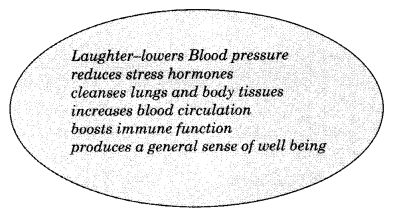

 <
<